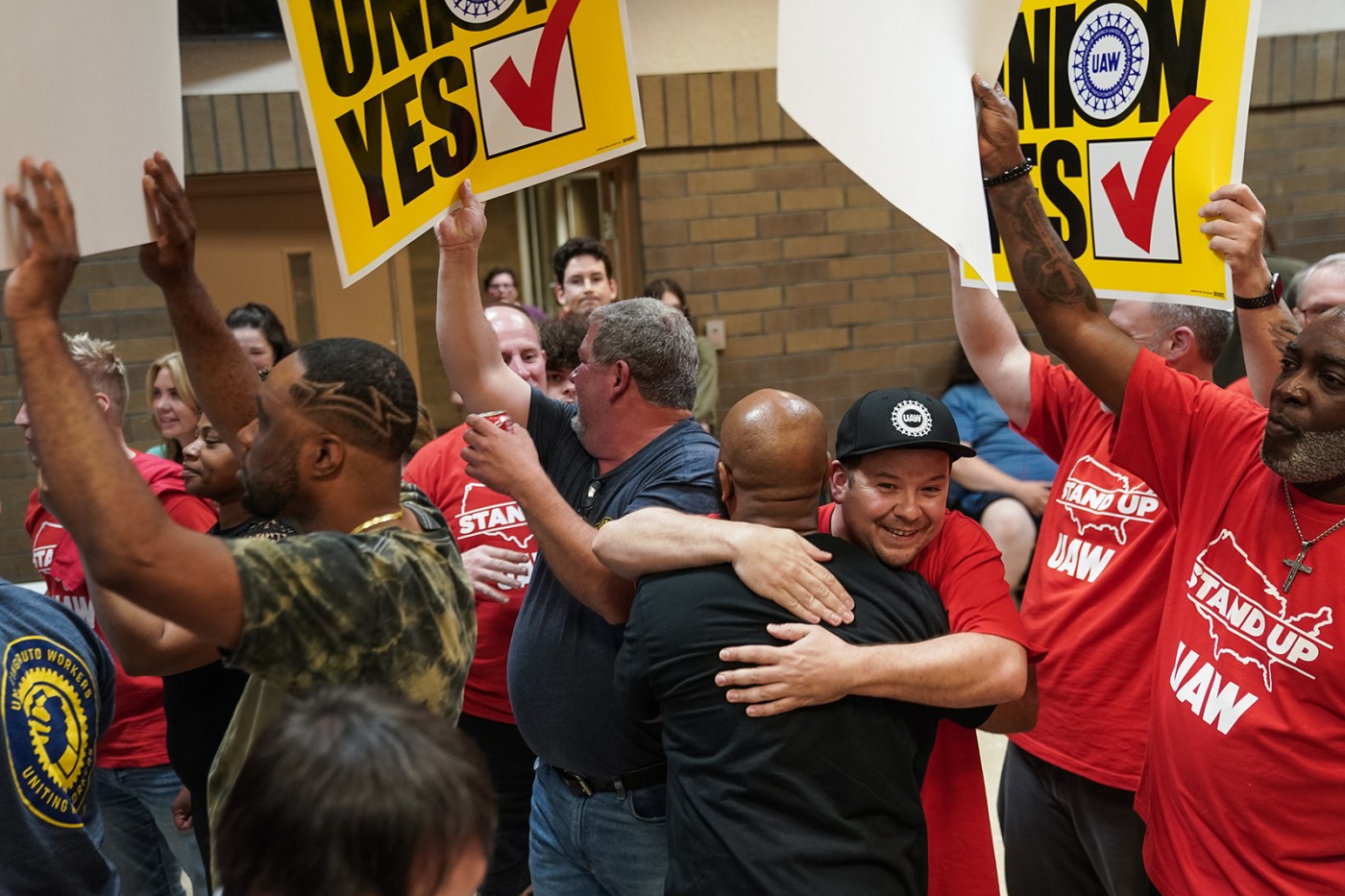
As a key labor union pushes into the South, red states push back
Kevin Hardy | Stateline.org (TNS)
Just days before workers at a Mercedes-Benz plant in Alabama began voting last week on whether to unionize, Republican Gov. Kay Ivey signed a new law that would claw back state incentives from companies that voluntarily recognize labor unions.
Alabama’s move follows similar efforts in Georgia and Tennessee, where GOP leaders also have passed laws pushing against a reinvigorated labor movement.
The laws require that unions be formed only by secret ballots rather than the so-called card check process, in which employers can voluntarily recognize a union without a protracted election process. And under the laws, companies that voluntarily recognize unions risk losing state incentives, which amount to billions of dollars invested by governments to bring automakers to the region.
These new laws speak to the growing push of labor unions into Southern states — and the fierce opposition of pro-business GOP leaders there. For decades, the region has attracted investments from foreign automakers with lucrative tax breaks, low-cost labor and a lack of labor unions. Labor leaders hope that is changing now that workers at Volkswagen’s plant in Chattanooga, Tennessee, overwhelmingly endorsed a union in April, becoming the first foreign auto plant in the South ever organized by the United Auto Workers.
Unions such as the UAW argue their involvement can help boost wages and improve the work environment at auto plants. But GOP forces in the South view unions as an existential threat to their manufacturing economies — of even more importance now that states are increasingly competing for electric vehicle and battery plants.
Mercedes-Benz workers outside of Tuscaloosa, Alabama, on Friday voted against joining a union at their plant, in a setback for the labor movement. But more organizing drives are underway in Alabama and South Carolina, as well as in California.
Many Southern states where unions have begun to focus already are less friendly to organizing. They are so-called right-to-work states, where each employee in a workplace can decide whether to join and pay union dues, though all workers are represented by the union.
Seeking to capitalize on major contract wins it secured for workers last year at the nation’s Big Three automakers (GM, Ford and Stellantis), the United Auto Workers union announced plans to spend $40 million through 2026 to help organize workers at auto and battery plants across the country, with a particular focus on the South. The union did not respond to multiple Stateline requests for comment.
A week before April’s monumental vote at the Tennessee Volkswagen plant, six Southern Republican governors warned that unionization would jeopardize the region’s auto jobs. In addition to Ivey in Alabama, the governors of Georgia, Mississippi, South Carolina, Tennessee and Texas also signed on.
And Ivey continued to rally against organized labor in auto plants last week, as she announced she had signed the state’s bill regarding secret ballots.
“Alabama is not Michigan,” Ivey said at a chamber of commerce event last week. “… We want to ensure that Alabama values, not Detroit values, continue to define the future of this great state.”
It’s unclear how much impact the new laws will have. The vote in Chattanooga was conducted by secret ballot with nearly three-quarters of all workers who voted in the election choosing to join the UAW. Tennessee awarded Volkswagen more than $500 million in incentives to build its plant there in 2008.
To Tennessee state Rep. Yusuf Hakeem, the 2023 law regarding union elections passed in his state was yet another GOP effort to “blockade” union power in the South.
“It’s typical, in my view, for Southern states to have that kind of a mindset: to have less of a voice for workers as opposed to having an exchange between workers and employer,” said Hakeem, a Democrat.
Hakeem said the UAW’s landslide win in his hometown of Chattanooga exposed a political miscalculation on the part of Republicans who view economic development prospects and union organizing as mutually exclusive.
“I thought it was huge,” he said. “They thought that scare tactics would be the winning thing for them … and the union workers demonstrated that they have a backbone.”
‘Right-to-work’ states
The American Legislative Exchange Council, a conservative group known as ALEC that works with lawmakers across the country, introduced model legislation similar to the laws already passed in Alabama, Georgia and Tennessee.
ALEC did not respond to a request for comment, but the organization’s involvement could further push the legislative concept across red states, particularly in the South.
That expansion is likely to happen, said Vincent Vernuccio, a senior fellow at the Mackinac Center for Public Policy, a conservative think tank that worked with Tennessee Republican lawmakers on their legislation.
“We’re seeing a snowball effect,” he said of the legislation. “It is getting noticed and I fully expect it to spread.”
Vernuccio said most Southern employers had been “protecting their employees” by calling for secret ballot elections rather than the signing of union cards in the open.
“There could be peer pressure, there can be coercion and intimidation,” he said, “and probably even more common is the union’s trying to make sure that employees … are not receiving both sides of the story on what would happen if a union organized them.”
Billy Dycus, president of the Tennessee AFL-CIO Labor Council, viewed fierce GOP opposition to Chattanooga’s union effort as a boon to the cause.
“I think that helped more than it hurt,” he said. “People say, ‘You know what, we’re kind of tired of the government telling us how we should run our lives.’ “
Related Articles
Ticker: Legal Sea Foods steps up for veterans; Nasdaq sets another record
Home Showcase: Hit the beach in North Falmouth
Hitting the road? Expect higher gas prices over Memorial Day
Here’s how much you have to earn to qualify as middle class, new study says
Hot Property: Caping for a Sandwich Colonial
Dycus, whose organization represents more than 60,000 union workers in the state, including teachers, steelworkers and nurses, said labor leaders have little incentive to mislead or pressure employees to join unions, especially in right-to-work states. Dycus said that because workers can choose whether to join unions, organizers must continually prove their worth to maintain membership and dues.
“They think that card check means we go in and twist arms and force people to sign cards. That doesn’t make any sense because you’re in a right-to-work state,” he said.
Opponents of the new union voting laws argue that pushing for elections through secret ballot run by the National Labor Relations Board — as opposed to card check — can subject workers to anti-union messaging from management. Such elections also might delay the inevitable, they argue, in cases where the union has identified a clear majority of support.
But pro-business Republicans portray the new laws as ways to protect the privacy of individual workers, who might feel peer pressure to sign union authorization cards in a card-check scenario.
“There’s absolutely nothing in this bill that would stop anybody from being able to unionize,” Georgia state Sen. Mike Hodges, a Republican who carried his state’s bill on the floor for Republican Gov. Brian Kemp, said in an interview.
Hodges said the new law aims to ensure a “level playing field” in union decisions. He noted that his father, a member of the International Brotherhood of Electrical Workers in Georgia, raised him and three siblings on union wages and benefits.
“We didn’t say we don’t want unions,” Hodges said. “Bless your heart, if you want to unionize, unionize.”
Alabama state Sen. Arthur Orr, a Republican who sponsored the legislation in his state, said the secret ballot process protects workers from both management and union leadership.
“Employees are caught in a tug of war, if you will,” Orr said. “Having the secret ballot provides the employees the ability to say what they want to, one side or the other. But when it comes to the ultimate voting, they can do it privately.”
Union expansion could hurt economic development prospects, Orr said, but workers always have the right to unionize.
“If companies are not taking care of their workers — and you can define that as you will, whether it’s pay or whether it’s time, job flexibility, safety, whatever — then that makes them vulnerable to an organization effort,” he said.
Legal challenges
While some labor advocates have argued the state bills could be preempted by federal labor law, Orr said he consulted with several attorneys on Alabama’s legislation. He noted that Tennessee’s law had not been challenged in court.
Still, it’s a “close question” as to whether these laws would hold up to a legal challenge since federal laws govern most labor issues in the private sector, said Benjamin Sachs, a professor of labor and industry at Harvard Law School. Some labor advocates expect courts could strike down the state laws, finding them preempted by federal labor law.
“What I can say for sure is that if it’s not preempted, then we are really opening up the landscape to dramatically more state and city intervention into labor relations and the rules of union organizing,” he said in an interview.
In his blog, OnLabor, Sachs warned anti-union forces to be careful what they wished for: If the Southern GOP laws stand, he wrote, it could open the door to blue states passing a litany of bills with opposite aims.
“If red states are entitled to tie economic incentives to a ban on card check, then blue states presumably are entitled to tie economic incentives on a requirement for card check,” he added in the interview.
While the recent labor win in Tennessee shows unions in the South can still succeed with a secret ballot process, Sachs said the legislation could have a “chilling effect” on companies that would otherwise prefer to voluntarily recognize unions.
“If it weren’t a big deal, they wouldn’t have enacted these laws,” he said.
Stateline is part of States Newsroom, a national nonprofit news organization focused on state policy.
©2024 States Newsroom. Visit at stateline.org. Distributed by Tribune Content Agency, LLC.

